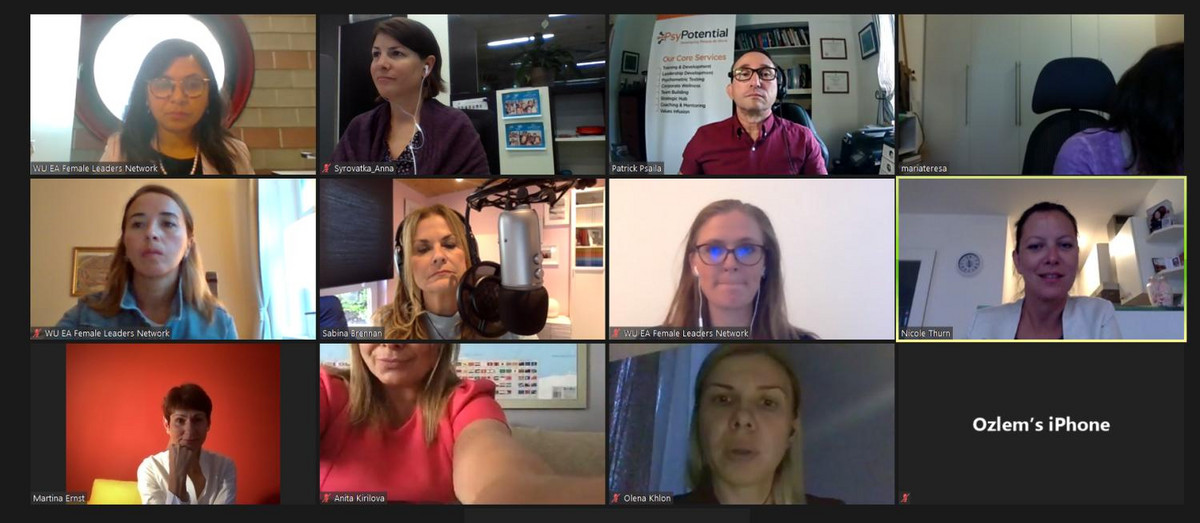Overview
Recommendations
Next Steps
Social media
How the pandemic and home office affect the human psyche
The coronavirus pandemic is not only wreaking havoc on our emotional and psychological health, it also impacts the productivity of employees. Neuroscientists and psychologists recently convened for the “3rd Female Power Hour,” an online event organized at the WU Executive Academy, to discuss the psychological effects of the pandemic and the necessity to work from home as well as the steps executives can take to promote both their own and their employees’ mental health.

Around the globe, people are on edge due to the coronavirus crisis, which is taking a toll on both their physical and mental well-being. Social distancing, being stuck working from home most of the time, and increasing stress levels and anxiety all play a part in this.
“We are all feeling the consequences of the pandemic, albeit to different degrees,” says Priyanka Dutta-Passecker, co-founder and board member of the WU Executive Academy’s Female Leaders Network. Priyanka Dutta-Passecker, a neuropharmacologist, start-up entrepreneur, and Global Executive MBA alumna, organized the “3rd Female Power Hour” after having observed that a great number of people are deeply worried and scared or are feeling lonely and depressed. At the online event, which recently took place in the context of the WU EA Female Leaders Network, international guests spoke about “Reimagining Mental Health in COVID-19 Times.”
Read on for two different perspectives on the learnings gained in the course of the evening: one focuses on what executives need to know now; the second highlights concrete measures to be taken based on this knowledge. The results may surprise you.

“If we gain a better understanding of what keeps our brain happy, we will also know more about the factors that are important for our emotional and psychological health,” says Sabina Brennan, an Irish neuroscientist and author of the book “100 days to a younger brain.” The brain’s structure is very complex. While it is a fact that social distancing measures have an impact on our brain’s health, the brain is also very resilient. “The brain has an ability called neuroplasticity. It can quickly adapt to new situations, reorganize, and change,” Brennan explains. The brain learns from new experiences and develops new neural networks. There are seven core factors that help the brain stay healthy and resilient and keep us psychologically and emotionally fit to tackle the current challenges:
Get moving. By being active and engaging in physical activity, you can make sure your body gets plenty of oxygen, eliminates stress hormones such as cortisol, and produces chemical compounds that improve your brain’s neural network instead. This is why cardio is not just good for your heart but also your brain.
Use your brainpower. Learn something new every day, make an effort to remember things, and engage in little brainteasers on a daily basis to boost your brain’s performance. “To keep our brain healthy as we age, we must keep challenging ourselves,” Sabina Brennan advises. If we fail to do so, our neural connections will steadily decrease from the age of 60, even causing the brain to shrink in size.
Stay social. We all need human contact. Even just ten minutes of social interaction a day are enough to improve the brain’s performance.
Cherish sleep. While we sleep, the brain regenerates and processes everything we experienced during the day. For this reason, it is absolutely essential to keep good sleeping habits and make sure to get enough sleep.
Choose balance. Another factor that is anything but optional: a sound balance of performing, unwinding, work, social life, family, and time for yourself.
Be present. Focus on what needs to be done right now.
Keep smiling. By keeping a smile on your face and laughing, you will lower your cortisol levels. Entertaining films and podcasts as well as pleasant exchanges with your colleagues and friends can help you stay positive. If that seems hard to accomplish: make a habit of smiling at yourself in the mirror in the mornings and evenings.
And not just to the coronavirus but also to the psychological and emotional repercussions that the pandemic entails, says Maria Teresa Ferretti, a neuroscientist specialized in neuroimmunology and Chief Scientific Officer of the “Women’s Brain Project,” which researches women’s mental health. Middle-aged and elderly men are at a significantly higher risk of death from COVID-19 than women of the same age groups. Then again, women present with atypical symptoms more frequently and suffer from anxiety, anxiety disorders, and depression much more often than men. What is more, mental illnesses tend to manifest with different symptoms in women and men, which makes it all the more important to consider a patient’s gender when treating them.
The psychologist and training consultant Patrick John Psaila agrees that social isolation and deprivation lead to an enormous amount of psychological stress. As a social field, a person’s work environment is especially important, says the director of PsyPotential. “This is where people interact with each other, develop ideas together, and sometimes even become friends.” All of that becomes much harder when it has to be done from home and through online communication.

Patrick John Psaila
My experience with clients and their feedback has also taught me that digital communication can intensify social relationships, as long as it takes place one on one.
At the beginning of the pandemic and against all odds, companies saw an increase in their employees’ productivity. “With every week that people are told to continue to work from home, however, an ‘isolation fatigue’ sets in, siphoning off their motivation.” When it comes to productivity, leaders need to consider the emotional effects of the coronavirus crisis as well.

Foster social relationships within the team: Having to work from home can impact employees’ mental health in different ways – and gender plays a role here. “Women tend to have a harder time working from home as they draw on their work surroundings for social and emotional support. Most men use their work environment to further their careers and focus more on their assignments,” Psaila says.
Online meetings should not just focus on advancing joint projects and discussing open topics but also allow for socializing. Patrick Psaila recommends a daily check-in with the entire team. “In such a setting, it is easy to share how you are doing.” Managers can also encourage their employees to talk to a colleague, which strengthens the relationships among team members and makes room for a personal exchange.
Fight low motivation with fun: Being forced to work from home can severely impact the joy and motivation people find in their work. Digital team-building measures are a good way to bring back the fun. Scheduling activities on a regular basis can help the team regain their strength, especially in difficult phases. Just one example: origami. Have one colleague instruct the others in how to fold the paper. The results will not fail to make everyone laugh.
Enable flexibility: Psychologist Patrick Psaila also points out that many people have a proclivity to stay “on” all the time when they work from home. They remain within reach for their colleagues through their laptops and smartphones. Managers should make sure that does not happen by not requesting results at once and at all times and also show consideration when it comes to childcare and visits to the doctor.
Combat Zoom fatigue: An initially euphoric “we can do it” vibe has given way to a certain fatigue in the face of constant digital communication. “Water cooler moments” that serve to reduce stress are important: taking short breaks to stretch your body or get some fresh air during the work day can help you recharge your batteries and stay productive. Executives should see the benefits of such behavior and lead by example.
Acquire new skills: Remote management calls for a different skill set than a strictly analog leadership style, Patrick Psaila says. “Being results-driven, savvy when it comes to new technology and digital tools, happy to educate yourself with respect to knowledge management and online communication” are absolute key.
Focus on the good stuff: “Our brain is subject to a negativity bias: it perceives risks and problems more keenly than chances and opportunities,” Psaila says. Knowing this, we need to actively withstand this instinct “by focusing on solutions and opportunities, being grateful for what we have, and appreciating the people around us,” the psychologist recommends.
For information about how the COVID-19 crisis is affecting learning and studying at the WU Executive Academy, please click here.